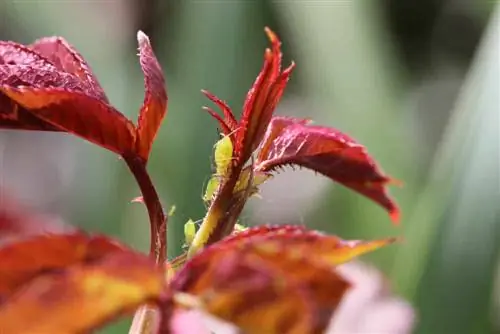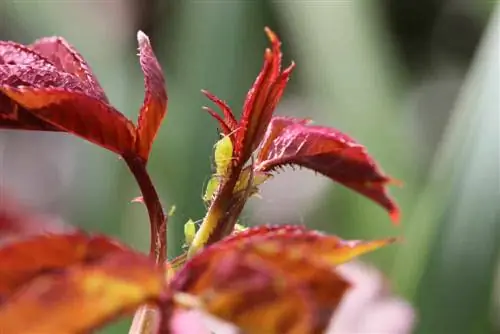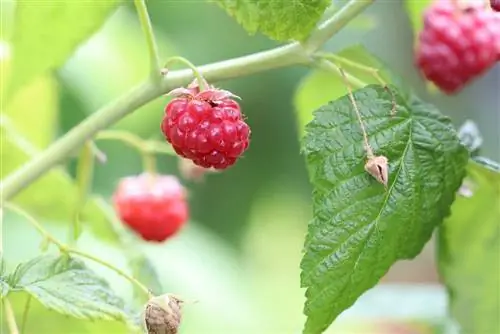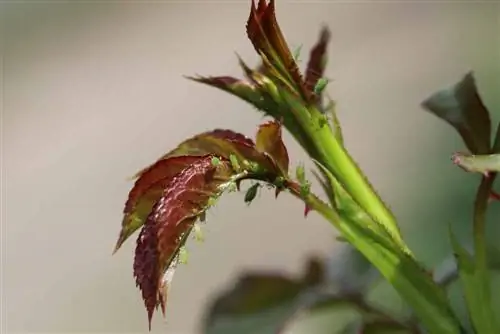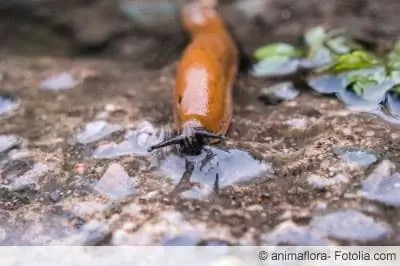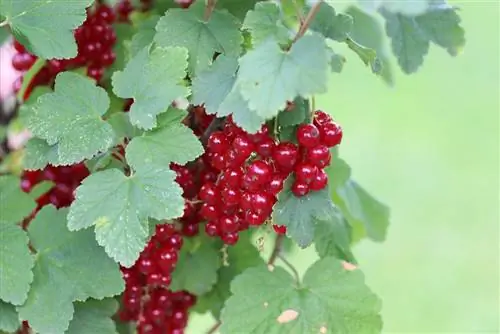- Author admin caroline@plants-knowledge.com.
- Public 2023-12-17 03:39.
- Last modified 2025-01-24 12:45.
Beautifully blooming roses are an eye-catcher in every garden, beautiful rose bushes are usually the favorites of hobby gardeners. But aphids also like the graceful plants and so the bushes and shrubs are often attacked by the unpleasant pests in spring and summer. Although aphids do not harm the entire plant, it will grow back again next year, but the beauty is affected, especially in the flowers and leaves that dry out or curl up.
Identifying aphids
Unfortunately, no garden is safe from aphids and roses in particular are often attacked by these small pests. Once a few of these pests have found their way into your own garden, it will happen very quickly until all rose plants are infested. A single louse produces up to five offspring a day, and they then give birth to their own larvae after just a few weeks. Therefore, action must be taken immediately upon detection so that the infestation cannot continue to spread unhindered. Therefore, you should always pay attention to the following signs on the roses:
- The insects are only a few millimeters in size, but can be recognized if you look closely
- the roses are growing poorly
- Buds fall off
- Leaves are stunted and curled up
- Plant has an overall sticky effect due to the excretion of lice, the honeydew
Tip:
If an infestation is detected, there is no need to resort to chemical treatment straight away. The first measure that can be taken is to spray the affected plants well with a water hose in the morning and evening. With some luck, the infestation has not yet progressed and this measure will already help.
Apply with soapy water
If an infestation of aphids is found on the roses, the hobby gardener should first try to combat them with natural household remedies. Spraying the rose plants with soapy water has proven to be particularly effective. However, you should not make the mistake of simply using detergent or perfumed products from the store. Because they contain fragrances and the synthetic composition, they are not suitable for use on rose plants. This loosens the protective wax layer on the rose petals and makes the plants susceptible to fungi. Therefore, when mixing the soapy water, proceed as follows:
- use pure potash soap as liquid soft soap
- mix with water to form a lye
- with added spirit the lye works even better
- the lye is sprayed onto the entire affected area of the plants
- the aphids suffocate under the lye film
- However, the application must be done several times a day to be useful
Using Neem for control
Neem, also known as neem oil, which can be sprayed on to combat aphids, is also suitable for combating aphids on roses. Neem is obtained from the leaves of the neem tree, an evergreen tree originating in Bangladesh and eastern India. Neem oil is known as a panacea in many cases and is also used effectively in pest control. Since the oil is harmful to many insects, including aphids, but not to people, plants and other animals, it can also be used in natural gardens. Neem oil is already available in many dosage forms in well-stocked stores and only needs to be sprayed onto the affected plants. The following happens to the pests:
- A few hours after treatment, the aphids become inactive
- feeding and sucking of plant sap is stopped
- the development of the existing lice and other offspring is stopped
Tip:
After treatment with neem, even visible aphids on the rose plants are no longer harmful to the flowers and can simply be hosed off with the hose. However, neem oil does not have a preventive effect.
Fighting with nettles
Another very effective measure is spraying with nettle broth. This can also be easily made by the hobby gardener as follows:
- Soak about a kilo of nettles in ten liters of water for a day
- this is how the nettle poisons are released, which are then sprayed undiluted onto the affected plants
- The advantage of nettle is that this decoction can get into the ground without harming other plants
- so the edibility of fruit and vegetables near the roses is not impaired
- the roses need to be sprayed with the nettle broth several times a day
- It must be ensured that all affected areas are hit
Tip:
Before starting the natural measures, it is also effective to pick the aphids by hand from the leaves and buds of the roses. In this way, a large number of pests can be removed before the plants are sprayed with home remedies.
Fighting with predators
Aphids certainly have enemies in nature that eat them. But due to the intervention of many gardeners in nature, these natural predators are often already banned from the garden. However, they can certainly be resettled near the lice-infested roses if they are given the environment to do so. But the hobby gardener needs a little patience when fighting the beneficial insects. On the other hand, a natural environment can be created. The following natural enemies can help fight aphids:
- Earwigs eat the lice
- Fill flower pot with straw or wood shavings
- hang upside down in the affected rose plants
- This accommodation and the presence of lice attract the earwigs all by themselves
- After the lice infestation has ended, remove the shelters from the plants again
- Earwigs nibble on the leaves of roses when there are no more aphids available to them to eat
- Ladybirds are the best-known enemies of aphids
- an adult beetle can eat up to 200 lice a day
- the larvae of the beetles even contain 300 to 400 lice
- Ladybird larvae can be found and collected under leaves
- It is also possible to purchase a pack of 150 ladybird eggs from well-stocked retailers
- this is enough for about 10 square meters
Tip:
If ladybugs are settled from eggs, they need at least 20 ° Celsius for the larvae to hatch. It therefore makes sense to let the eggs hatch in a warm place, such as a small cactus house on the windowsill. Once the larvae have hatched, they can be settled on the infected roses.
Prevention
Of course, it is always desirable that aphids do not spread on the roses in the first place. Therefore, infestation should be prevented in late winter. For this purpose, the soil is fertilized with nitrogen. But over-fertilization should definitely be avoided here. This is intended to strengthen the plants, but not to make them more attractive to pests. A mixed culture of roses, between which savory, onions or other plants with essential oils are planted, also prevents infestation by aphids.
Tip:
A natural garden in which many beneficial insects find their place is always the best prevention against aphid infestation. If possible, you should also avoid planting many similar plants in a small space. A mixture of different plants prevents infestation.
Conclusion
If you take precautions in your garden and make it as natural as possible, you will have few problems with aphids. If the graceful roses have been attacked, there are many effective remedies to combat this. However, the chemical club should not be used here in order not to damage the sensitive nature. Many home remedies that are natural and do not harm the surroundings of the affected plants also help, the hobby gardener just needs to have a little patience. Ideally, natural predators of the aphids are established, which fight them in the most natural way and naturally feel most comfortable in a natural garden.

